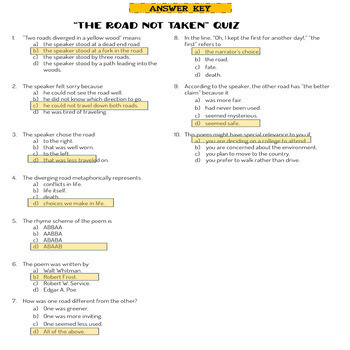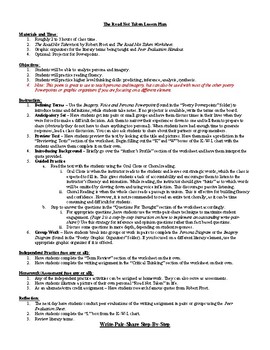

Thus far, the entire poem has been one sentence. This tonal shift subtly illustrates the idea that the concept of choice is, itself, a kind of artifice. This line initiates a change: as the speaker shifts from depiction to contemplation, the language becomes more stilted, dramatic, and old-fashioned. Having made his choice, the speaker declares, “Oh, I kept the first for another day!” The diction up until now has been matter-of-fact, focusing on straightforward descriptions and avoiding figurative language. However, as the poem reveals, that design arises out of constructed narratives, not dramatic actions. Decisions are nobler than whims, and this reframing is comforting, too, for the way it suggests that a life unfolds through conscious design. The poem masquerades as a meditation about choice, but the critic William Pritchard suggests that the speaker is admitting that “choosing one rather than the other was a matter of impulse, impossible to speak about any more clearly than to say that the road taken had ‘perhaps the better claim.’” In many ways, the poem becomes about how-through retroactive narrative-the poet turns something as irrational as an “impulse” into a triumphant, intentional decision. As soon as he makes this claim, however, he doubles back, erasing the distinction even as he makes it: “Though as for that the passing there / Had worn them really about the same.”įrost then reiterates that the two roads are comparable, observing-this time-that the roads are equally untraveled, carpeted in newly fallen yellow leaves: And both that morning equally lay Later in the poem, the speaker calls the road he chose “less traveled,” and it does initially strike him as slightly grassier, slightly less trafficked. The speaker briefly imagines staving off choice, wishing he could “travel both / And be one traveler.” (A fastidious editor might flag the repetition of travel/ traveler here, but it underscores the fantasy of unity-traveling two paths at once without dividing or changing the self.) The syntax of the first stanza also mirrors this desire for simultaneity: three of the five lines begin with the word and.Īfter peering down one road as far as he can see, the speaker chooses to take the other one, which he describes as … just as fair, The yellow leaves also evoke a sense of transience one season will soon give way to another. One forest has replaced another, just as-in the poem-one choice will supplant another. An inveterate New England farmer and woodsman, Robert Frost would have known these woods were “new”-full of trees that had grown after older ones had been decimated.

Both birches and alders are “pioneer species,” the first trees to come back after the land has been stripped bare by logging or forest fires.

The leaves of both turn bright yellow in fall, distinguishing them from maple leaves, which flare red and orange. The yellow leaves suggest that the poem is set in autumn, perhaps in a section of woods filled mostly with alder or birch trees. Defining the wood with one feature prefigures one of the essential ideas of the poem: the insistence that a single decision can transform a life. In his description of the trees, Frost uses one detail-the yellow leaves-and makes it emblematic of the entire forest. Out walking, the speaker comes to a fork in the road and has to decide which path to follow: Two roads diverged in a yellow wood, “The Road Not Taken” begins with a dilemma, as many fairytales do. … Mea culpa.” However, Frost liked to quip, “I’m never more serious than when joking.” As his joke unfolds, Frost creates a multiplicity of meanings, never quite allowing one to supplant the other-even as “The Road Not Taken” describes how choice is inevitable. Soon after writing the poem in 1915, Frost griped to Thomas that he had read the poem to an audience of college students and that it had been “taken pretty seriously … despite doing my best to make it obvious by my manner that I was fooling. When they went walking together, Thomas was chronically indecisive about which road they ought to take and-in retrospect-often lamented that they should, in fact, have taken the other one. Robert Frost wrote “ The Road Not Taken” as a joke for a friend, the poet Edward Thomas.


 0 kommentar(er)
0 kommentar(er)
